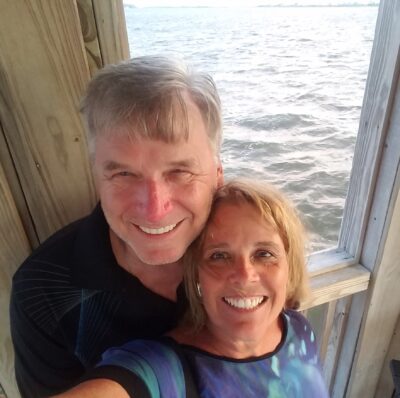
(3-2-24) I was staring at the wall clock in the INOVA Fair Oaks (Va.) Hospital when the emergency room doctor spoke but I cannot tell you now what time it was. I only know that it was at that single moment when my entire life changed.
Just before Christmas, I’d fallen while hiking in the Shenandoah, breaking three ribs. Seven weeks later, I began gulping for breath whenever I walked upstairs. An x-ray revealed fluid in my right lung, which caused my wife, Patti and me to drive to the ER.
The fluid needed to be drained, the first ER doctor explained, while ordering a CT scan. Patti was nervous. “What’s taking so long?” she asked. The doctor finally returned. “We have a problem. There are three masses in your right lung.” Masses? My first reaction: “They must be from my hiking accident.” He replied: “They are highly suspicious.”
A second ER doctor arrived to schedule the draining of fluid and admit me into the hospital. “Do you understand what you are dealing with?” he asked. I blamed my fall. He said, “Cancer. Lung Cancer.” Patti and I stared at each other. Stunned! The doctor continued typing into a computer without making eye contact. Not a hint of empathy or emotion. “Lung Cancer that’s metastasized is Stage Four,” he said in a voice no different from when someone orders a pizza.
Patti urged me: “Don’t check the Internet.” I did. In less than an hour, I’d gone from being a hiking fall victim to having a fatal lung disease. “This can’t be happening,” I said out loud. Not to me.
A non-smoker, where did this come from?
Patti’s first husband died in his thirties from cancer. Three of Patti’s siblings died from cancers, and she and her brother are cancer survivors. But that is her family history, her genetics, not mine. I’m 72 but am fit. My son and I hiked the Grand Canyon last year. I only take one pill a day for high cholesterol. My parents died in their nineties. I never smoked. “This can’t be happening,” I repeat. Disbelief. I feel trapped in a Black Mirror episode.
Three of my children arrive at the ER. I see their tears, their shock. Patti and I can’t sleep. An Internet site noted most Stage Four lung cancer patients die within six months. We reach out and clutch each other’s hands throughout the night. “I’ll never see my grandchildren grow up,” I blubber. I’m an emotional wreck. “I’m sorry I am putting you through this again.” A second husband with cancer. My thoughts shift between self-pity to practical steps: updating my will, making a list of computer passwords. Who will get my parent’s heirloom clock? The trunk of magic tricks I have kept from my preteens? Patti and I had plans. Disneyland with two granddaughters in March.
I know minutes last 60 seconds, but they seem longer. Waiting is torture. Doctors drain 1.5 liters from my right lung for analysis. A pulmonologist, Dr. Depak Soni with Pulmonary and Critical Care Specialists, arrives. Friendly, casual, caring. I liked him. “I wouldn’t be so quick to jump to cancer without further testing,” he said. The hiking fall could be to blame. An oncologist arrived. She concurred. Probably the fall. The discharge nurse, who observed our night of anguish, volunteered, “You don’t have cancer.” Yet that ER doctor’s voice had crawled inside our heads – words that won’t leave.
Waiting for confirmation
Dr. Soni couldn’t see us for a week with the lung fluid analysis. I spent hours composing a furious letter in my head, chastising the ER doctor of putting us through an unnecessary hell. It had to be my fall.
The few friends we tell quickly responded. One offered to fly ASAP from Illinois to see me. Another wrote: “If it’s cancer, it’s all part of God’s master plan.” What? God wants me dead? Another urged me to be positive. “You can beat this!” Ironic words, because I had used those same ones two weeks earlier when bolstering a friend being treated for colon cancer. It’s what you say.
Our appointment with Dr. Soni falls on Valentine’s Day. Patti and I always exchange love letters rather than buy gifts but decide to postpone any celebration. “I wish I had better news,” he said. “Adenocarcinoma.”
I am now one of the 1.9 million Americans diagnosed annually with cancer. I am now one of the 234,580 diagnosed with lung cancer. Cancer and heart disease are the two main causes of death in the U.S..
Finding a treatment team
Patti immediately called two of her closest friends, both nurses. They gave her the name of the best lung cancer doctors in our area. We made appointments, but first I needed to return to the hospital to have two more liters drained from my right lung.
More waiting for test results. A PET scan showed the three masses are confined in my right lung. This is the first promising news that we’d received. A brain scan is scheduled to insure the cancer has not reached there.
We chose an oncologist: Dr. Alexander Spira, director of Virginia Cancer Specialists. He explained that while my cancer cannot be cured, it can be treated. It can be kept at bay. No one knows how long – months, a year, five years, ten years, but he offered us hope. He explained options: targeted therapy, immunotherapy and, of course, chemotherapy. He was witty and kind. We felt confident working with him.
A new journey in my life
When I got divorced, I started a new journey in my life. It led me to Patti, who has been and is the love of my life. When Kevin was diagnosed with bipolar disorder, arrested, and tasered by police, I began another journey – one that turned me from being a journalist into becoming an advocate. That journey gave me a purpose and led to me meeting so, so many courageous advocates who are pushing for better mental health care and an end to the unnecessary incarceration of those whose only real crime is that they became sick. We became co-travelers.
Now, I am on another journey. I did not seek it, nor want it, or even imagine that this would be in my future. I am still in the denial and anger and sadness stages. I doubt the sadness stage will ever pass.
A good friend whose wife spent 30 years, mostly bedfast, battling multiple sclerosis, sent me an email: “Don’t let test results stop you from living your life…There can be beauty in something traumatic, but you must look for it. Create that beauty.” His wife inspired others with her positivity during her illness. Until her death, she telephoned people in her church who were ill to express concern and simply chat.
I am not there yet. I do not see beauty. Maybe someday, I will find a silver lining on this journey just as I have done before. Patti reminds me that I have a fantastic care team now. I have a loving family and supportive friends. New medicines emerge all of the time. She assures me that we will walk this journey together with our family.
Of that, I am certain.



